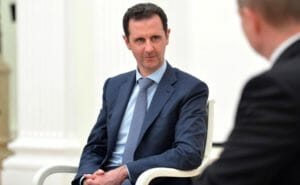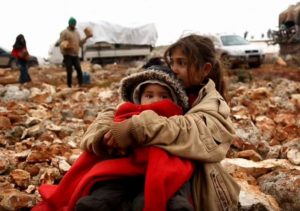Stalemate Is Preferable to Intervention in Syria
The major threat in the Middle East to international peace is Syria's civil war, not the rhetorical battles between Iran and an Israel that claims to be straining against its American leash.The major threat in the Middle East to international peace is Syria’s civil war, not the rhetorical battles between Iran and an Israel that claims to be straining against its American leash.
The Syrian war is the focus of Sunni-Shiite rivalry, the clashing interests of Iran and Saudi Arabia and Qatar, the Russian investment in the Mediterranean and in Syria, and the Israeli-promoted American hostility to Syria and Iran.
Syria’s is now a war that neither side can win, although on the testimony of the Syrian Observatory of Human Rights, some 27,000 people have now been killed, more than two-thirds of them civilians.
The government in recent days has systematically bombed successive zones of the country’s largest and oldest city, Aleppo, in the northwest. The rebels have no effective defense or counter to the destruction being delivered by the country’s air force. They have no reason to hold the ground they have already taken, as the residents leave out of fear of the air attacks or in despair. Aleppo had, until the war, a population of a little over 2 million people, mostly Sunnis, but including some quarter of a million Christians. Its Old City is thought to be the oldest continuously populated city on earth, its origins in the sixth millennium B.C. It is a UNESCO World Heritage Site.
The country is in serious danger of breakdown, under this pounding, to become a second Somalia. This was the warning given by the Russian vice-minister of foreign affairs, Mikhail Bogdanov, during a visit to Paris last weekend, meeting Syrian dissidents and French officials.
The Russian position with respect to the uprising and repression remains support for the established government of Bashar al-Assad, and for the peace conference former U.N. Secretary General Kofi Annan has proposed, on the model of the Taef Conference in 1989, which ended the Lebanese Civil War.
It would be composed of representatives of the Syrian regime and the insurgents, together with leaders of the Christian, Druze and Alaouite communities (there are still other minorities: Kurds, Turks, Iraqis, Armenians), and of the interested outside parties, which would include Russia and the United States, as well as France, the former colonial power.
Russia has a small naval base in Syria and an interest in Syria’s survival that derives from the Cold War years and from the fact that there is now a large Syrian-Russian community as the result of the marriages to Syrians of Russian sailors and officials and others stationed in the country.
Bogdanov also said that Assad has assured Moscow that he is prepared to leave office if an election took place in his country rejecting him. There is no confirmation of this promise from Damascus, and in a sense, it states what would be inevitable were such an election to take place — of which there is no present sign. However, this offer is part of what Russia seems prepared to bring to the table if the conference proposed by Annan, which is endorsed by the U.N. Security Council, were to be held.
However, the U.S. and its Western allies have been discussing a draft U.N. resolution under Chapter VII of the Charter, which would authorize an armed intervention from outside, as in Libya last year. Since neither the U.S. nor any other government seems willing to carry out such a resolution, were it voted, it won’t be voted, which is to be desired, since military intervention would make things worse.
U.N. mediation has been resumed by the former Algerian official Lakhdar Brahimi. He has been in Cairo, where a meeting took place on Monday of Turkish, Saudi Arabian, Iranian and Egyptian officials, under Egyptian President Mohammed Morsi’s sponsorship, on the subject of a Syrian cease-fire. Mr. Brahimi now intends to go to Syria and to see Assad.
This is important because the Syrian civil war must be understood in the context of the rivalry between Sunnis and Shiites in Iran and their allied Hezbollah in Lebanon, and what now is Shiite-dominated Iraq (thanks to George W. Bush, Richard Cheney, the American Neo-Conservatives, Israel and AIPAC, collectively those responsible for the invasion and destruction of Sunni Iraq).
The Sunni alignment in the Middle East is led by Saudi Arabia and Qatar, and some of the other Gulf principalities, which are the principal supporters and funders of the Muslim Brotherhood groups that in Egypt, Libya and Tunisia have been the main political beneficiaries of the Arab Awakening.
This is not a crisis made for Western intervention, whatever the opinions voiced in French interventionist circles and during the American presidential campaign. It will have to be solved by the Arab states, and the lead taken by Egypt’s new president as well as the appointment by the U.N.’s Ban Ki-Moon of an Algerian mediator are positive signs. The very fact that this war approaches stalemate is reassuring. There is nothing to be gained by continuing.
Visit William Pfaff’s Web site for more on his latest book, “The Irony of Manifest Destiny: The Tragedy of America’s Foreign Policy” (Walker & Co., $25), at www.williampfaff.com.
© 2012 Tribune Media Services, Inc.
Your support matters…Independent journalism is under threat and overshadowed by heavily funded mainstream media.
You can help level the playing field. Become a member.
Your tax-deductible contribution keeps us digging beneath the headlines to give you thought-provoking, investigative reporting and analysis that unearths what's really happening- without compromise.
Give today to support our courageous, independent journalists.



You need to be a supporter to comment.
There are currently no responses to this article.
Be the first to respond.